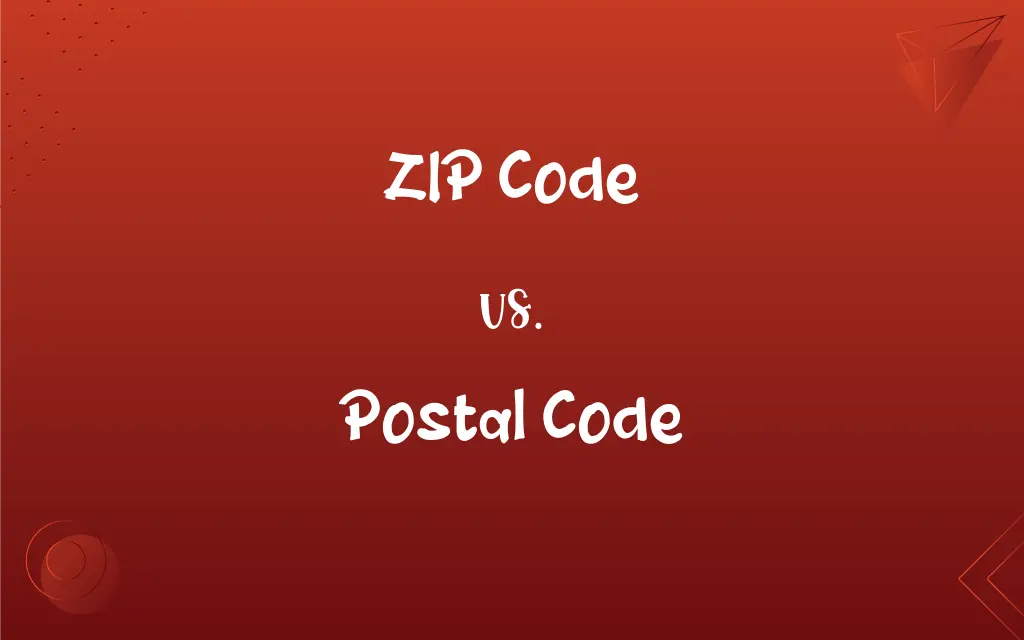ZIP Code vs. Postal Code: What's the Difference?
Edited by Aimie Carlson || By Harlon Moss || Updated on October 4, 2023
A zip code is a system used in the U.S. to designate mail delivery areas, while a postal code is a generic term for numerical addressing systems used globally.

Key Differences
The zip code is a term that specifically refers to the mail routing system used within the United States. This system was introduced by the U.S. Postal Service in 1963 to ensure efficient mail delivery. In contrast, the term postal code is a more generic term that pertains to numerical or alphanumeric codes used by various countries worldwide to sort and deliver mail more efficiently.
When you hear the term zip code, it directly relates to the "Zone Improvement Plan," which was the rationale behind its inception, focusing on improving mail traveling efficiency and accuracy within the U.S. Meanwhile, a postal code doesn't imply a specific plan or strategy but simply denotes an addressing system used to facilitate mail delivery.
In essence, every zip code is a postal code, but not every postal code is a zip code. This distinction arises because while both serve similar primary functions of sorting and directing mail, the terminology is region-specific.
Contextually, if someone asks for a zip code, they are likely referencing an address within the United States. Conversely, asking for a postal code would be more common when inquiring about international addresses or addresses in countries other than the U.S.
The format can also differ. For instance, a typical zip code might look like "90210," whereas a postal code in Canada appears as "K1A 0B1," showcasing alphanumeric characters.
ADVERTISEMENT
Comparison Chart
Country of Origin
United States
Used globally
Meaning
Zone Improvement Plan
General term for mail sorting code
Example
90210
K1A 0B1 (Canada), SW1A 1AA (UK)
Alphanumeric Characters
Typically no, but extended ZIP+4 codes exist
Yes, in many countries
Specific or Generic Term
Specific to U.S.
Generic, used in multiple countries
ADVERTISEMENT
ZIP Code and Postal Code Definitions
ZIP Code
The American numerical code for postal sorting.
Each city in the U.S. has its distinct zip code.
Postal Code
A numerical or alphanumeric system used globally for sorting mail.
The postal code for that area is SW1A 1AA.
ZIP Code
The U.S. version of a postal addressing system.
When moving to a new city, you'll have a new zip code.
Postal Code
A sequence of letters and/or numbers assigned to specific geographic areas to facilitate mail delivery.
Ensure the postal code is clearly written on the envelope.
ZIP Code
An addressing tool to expedite and organize mail within the U.S.
Make sure you write the correct zip code on the package.
Postal Code
A generic term representing mail routing codes, irrespective of the country.
The postal code helps in the efficient sorting of mail.
ZIP Code
A system introduced by the U.S. Postal Service for efficient mail delivery.
Her zip code in Los Angeles is 90210.
Postal Code
An international system to categorize and streamline mail delivery.
Different countries have varying formats for their postal code.
ZIP Code
A series of digits representing specific mail delivery areas in the U.S.
Can you tell me the zip code for that address?
Postal Code
Addressing codes that aid in the distribution of letters and packages.
Each region has a unique postal code to distinguish it.
FAQs
What does "zip" in zip code stand for?
"Zip" in zip code stands for "Zone Improvement Plan."
Can a city have more than one zip code?
Yes, large cities often have multiple zip codes.
Is a postal code the same worldwide?
No, postal code formats differ from country to country.
Why was the zip code system introduced?
The zip code system was introduced to improve mail delivery efficiency within the U.S.
How many digits are in a standard U.S. zip code?
A standard U.S. zip code has five digits.
How do I find my zip code?
You can use online tools, maps, or local post offices to find your zip code.
How are postal codes determined for new areas?
New postal codes are assigned based on factors like geographic and administrative boundaries.
Are zip codes and postal codes essential for mail delivery?
Yes, both zip codes and postal codes play crucial roles in ensuring efficient and accurate mail delivery.
Which countries use the term postal code?
Many countries, like Canada, the UK, and Australia, use the term postal code.
Do all countries have a postal code system?
Most countries have a postal code system, but the format and name can vary.
Are postal codes unique to each country?
Yes, each country's postal code system is unique in format and sequence.
What's the difference between ZIP and ZIP+4 codes?
ZIP+4 codes provide more specific location data than the standard 5-digit zip code.
Is a zip code always numerical?
In the U.S., a basic zip code is numerical, but the extended ZIP+4 format includes a hyphen.
Is postal code used in the U.S.?
The U.S. primarily uses the term zip code, but postal code can be understood as a generic equivalent.
Can a postal code be alphanumeric?
Yes, in many countries like Canada, the postal code is alphanumeric.
Is the term zip code used outside the U.S.?
The term zip code is specific to the U.S., but its meaning might be understood in other contexts.
Does every U.S. location have a zip code?
Nearly every location in the U.S. is covered by a zip code for mail delivery purposes.
Can I determine a location using its zip code?
Yes, a zip code can provide information about a specific region or area within the U.S.
How often do postal codes change?
Postal codes can change based on administrative decisions or changes in geographic boundaries, but such changes aren't frequent.
Why are there letters in some postal codes?
Some countries use alphanumeric postal codes to provide more precise location information.
About Author
Written by
Harlon MossHarlon is a seasoned quality moderator and accomplished content writer for Difference Wiki. An alumnus of the prestigious University of California, he earned his degree in Computer Science. Leveraging his academic background, Harlon brings a meticulous and informed perspective to his work, ensuring content accuracy and excellence.
Edited by
Aimie CarlsonAimie Carlson, holding a master's degree in English literature, is a fervent English language enthusiast. She lends her writing talents to Difference Wiki, a prominent website that specializes in comparisons, offering readers insightful analyses that both captivate and inform.































































